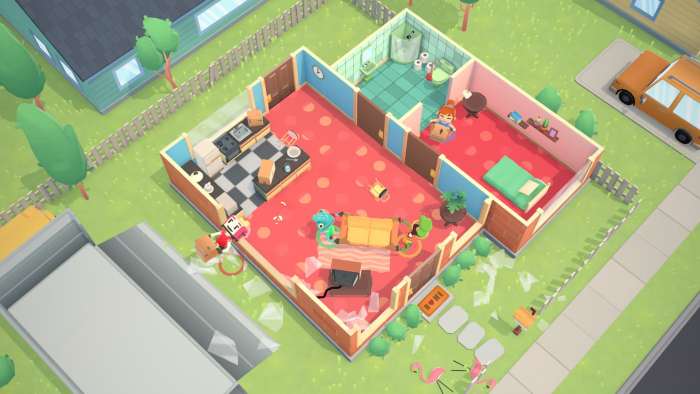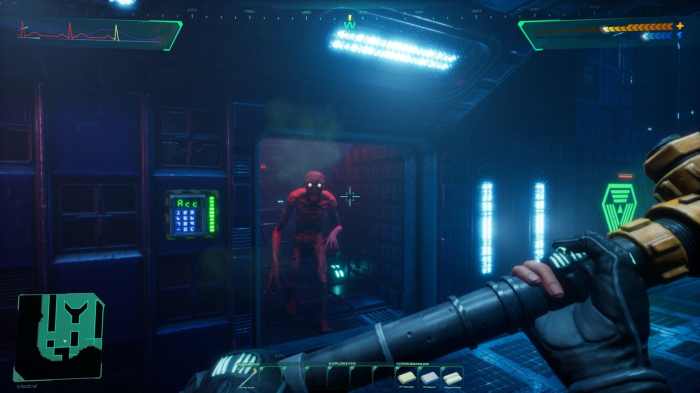Last week, The Game Awards hosted its fifth annual show, unveiling a look at the next generation of the Xbox, some game announcements (sequels for Hellblade, Bravely Default), and giving awards to the best of 2019’s games. However, preceding the awards was a quiet yet important announcement that could change how the industry approaches trade shows and fan conventions for the better.
The Games Festival was a 48-hour “digital event”, running from December 12 to 14, where developers offered demos for upcoming games on Steam for a limited time. The titles ran from cute cuddly indie fare like Moving Out to the hotly anticipated remake of System Shock. Once the event was over, the demos were no longer accessible.

So why does the festival matter? As someone who’s been to every major video game convention under the sun, I can tell you they can be challenging spaces for people with disabilities. Waiting in long lines, surrounded by crowds of people trying to push past you can already make finding accessible paths through a space an even bigger pain. Trade shows and conventions are also often pricey, meaning that many people with disabilities end up shelling out large amounts of money to find that they don’t get to enjoy the experience the same way that abled-body participants can.
The Games Festival is important because it’s a working template for how the industry can digitize the experience of E3, GDC, and PAX and open it up to everyone. For a lot of people with disabilities, waiting in lines just isn’t something they can physically do. Digital events eliminate that, letting you download the demo from the comfort of your desk or couch, thus bringing a huge part of the trade show experience to you. It’s a looming sea change that’s not only more inclusive but also cost efficient.
There are still concerns that developers and publishers will have about this setup, over builds somehow being stolen or the classic and understandable anxiety about showing their work off in a public capacity in the first place. However, I think that those are small obstacles ultimately. As much of the way modern gamers interact with the medium transitions from physical to digital, it feels that the waning prominence of physical trade shows will ultimately result in these sort of festivals becoming the standard in terms of how companies let players (from journalists to content creators to people paying for this experience) get their hands on games.
To be clear: I don’t think that things like PAX or E3 are going away in their entirety. Those places will likely always exist as a gathering event for fans of the medium who want to showcase their passion and celebrate games. However, such events are costly for both participants and the developers that are setting up booths and reveals. Travel, booking spaces, food, lodging – all of it costs a lot of money for everyone involved. A digital festival gets the information about the game out there, as well as a playable slice of it, for precious little of the cost and logistics it would to have a presence on a show floor or as part of a press conference in a stadium.

Nintendo and Sony have already left behind the once hallowed press conferences of E3 in favor of the streaming directly to their potential consumers. How long before the rest of the industry follows suit? The technology is there and the template for it as well. It’s merely a matter of getting the people who make such decisions accustomed to the idea of digital festivals and how to make money off of them (something similar to Blizzard’s digital BlizzCon Portal Pass as well as ads before you download is probably what will happen).
I’ve made it a habit over the years to try to avoid speaking about The Grand Future Of Video Games since such predictions have a habit of falling apart as time proceeds on. However, I really feel that these digital experiences, once organizers have figured out how to monetize it, are the future because it saves money while still essentially accomplishing what those physical ones do. And that’s great, because it will open the doors to a lot of people who can’t attend conferences, as far as getting hands-on with anticipated titles, because for disability-related matters. Games can be and should be a place for everyone. Here’s a way to make a huge slice of that dream a reality.
Javy Gwaltney is a publicist working with Private Division and other fantastic clients. He was once a Game Informer editor and spends most of his time writing words or thinking about replaying Mass Effect. You can find him on his twitter or his website.

